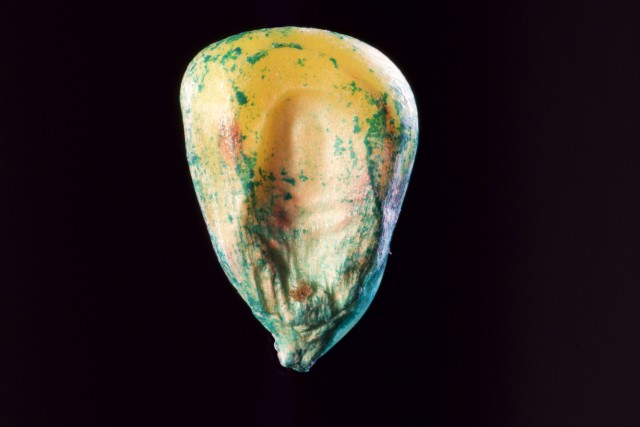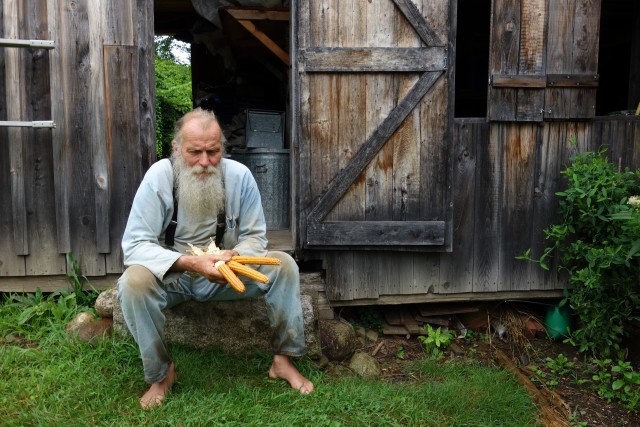
Taggart Siegel and Jon Betz stress the need for seed in activist documentary
SEED: THE UNTOLD STORY (Taggart Siegel & Jon Betz, 2016)
Cinema Village
22 East 12th St. between University Pl. & Fifth Ave.
Opens Friday, September 23
212-529-6799
www.cinemavillage.com
www.seedthemovie.com
 “We’re fooling with Mother Nature,” Montana organic wheat farmer and U.S. senator Jon Tester says in Seed: The Untold Story, a crunchy activist documentary opening September 23 at Cinema Village. Produced, directed, and edited by Jon Betz and Taggart Siegel, the film focuses on how ninety-four percent of vegetable seed varieties have disappeared over the last hundred years and how farming communities around the world are now trying to save and protect seeds while battling the government and such chemical companies as Monsanto. The facts are staggering; the number of varieties of cabbage has gone from 544 to 28, beets 288 to 17, cauliflower 158 to 9, artichokes 34 to 2, and asparagus 46 to 1. Betz and Siegel, who previously collaborated on Queen of the Sun: What Are the Bees Telling Us?, travel from India, Mexico, and Namibia to Hawaii, New Mexico, and Washington, DC, among other places, meeting with Native Americans, Native Hawaiians, and organic farmers who talk about the importance of the relationship between people and the land and how seeds, and corn in particular, are an intrinsic part of so many cultures. “Seeds are so crafty. There is a power . . . to me it’s magic. It’s a life force so strong,” anthropologist Jane Goodall says. “Corn ignited the sacred connection we have with seeds,” Mohawk Rowen White of Sierra Seeds explains. Bill McDorman of the Rocky Mountain Seed Alliance and Native Seeds/SEARCH compares a seed bank to Fort Knox, Will Bonsall of the Scatterseed Project says that bean and seed collections are like jewelry stores, while environmental lawyer and author Claire Hope Cummings proclaims, “Hybrid corn was the atom bomb of agriculture.” Also discussing the need for biodiversity and respect for nature’s bounty are Hopi Nation leader Leigh Kuwanwisiwma, ethnobotanist Gary Paul Nabhan, Center for Food Safety lawyers Andrew Kimball and George Kimbrell, Winona LaDuke of the White Earth Land Recovery Project, Kauai councilman Gary Hooser, an emotional Emigdio Ballon of Tesuque Pueblo, and Native Hawaiian and teacher Malia Chun, who calls what the chemical companies are doing “a disgrace to our culture.”
“We’re fooling with Mother Nature,” Montana organic wheat farmer and U.S. senator Jon Tester says in Seed: The Untold Story, a crunchy activist documentary opening September 23 at Cinema Village. Produced, directed, and edited by Jon Betz and Taggart Siegel, the film focuses on how ninety-four percent of vegetable seed varieties have disappeared over the last hundred years and how farming communities around the world are now trying to save and protect seeds while battling the government and such chemical companies as Monsanto. The facts are staggering; the number of varieties of cabbage has gone from 544 to 28, beets 288 to 17, cauliflower 158 to 9, artichokes 34 to 2, and asparagus 46 to 1. Betz and Siegel, who previously collaborated on Queen of the Sun: What Are the Bees Telling Us?, travel from India, Mexico, and Namibia to Hawaii, New Mexico, and Washington, DC, among other places, meeting with Native Americans, Native Hawaiians, and organic farmers who talk about the importance of the relationship between people and the land and how seeds, and corn in particular, are an intrinsic part of so many cultures. “Seeds are so crafty. There is a power . . . to me it’s magic. It’s a life force so strong,” anthropologist Jane Goodall says. “Corn ignited the sacred connection we have with seeds,” Mohawk Rowen White of Sierra Seeds explains. Bill McDorman of the Rocky Mountain Seed Alliance and Native Seeds/SEARCH compares a seed bank to Fort Knox, Will Bonsall of the Scatterseed Project says that bean and seed collections are like jewelry stores, while environmental lawyer and author Claire Hope Cummings proclaims, “Hybrid corn was the atom bomb of agriculture.” Also discussing the need for biodiversity and respect for nature’s bounty are Hopi Nation leader Leigh Kuwanwisiwma, ethnobotanist Gary Paul Nabhan, Center for Food Safety lawyers Andrew Kimball and George Kimbrell, Winona LaDuke of the White Earth Land Recovery Project, Kauai councilman Gary Hooser, an emotional Emigdio Ballon of Tesuque Pueblo, and Native Hawaiian and teacher Malia Chun, who calls what the chemical companies are doing “a disgrace to our culture.”

“I’ve always been dazzled by diversity,” Will Bonsall of the Scatterseed Project says in SEED
But as bleak as things might look — climate change continues while Monsanto keeps patenting seeds, suing so they don’t have to reveal what pesticides they use in experimental farming, and fighting legislation requiring labeling of genetically modified food products — the battle is far from over. “We will refuse to obey laws that force us to accept GMOs and patents,” says the ever-hopeful and brightly positive physicist, activist, and author Dr. Vandana Shiva, adding, “We need to protect the diversity, integrity, and freedom of life, give seed its own freedom so that we as humans can have our freedom.” The film is beautifully photographed by Siegel, with gorgeous shots of nature in almost every frame, aside from those that feature, um, corny animation. And Betz and Siegel make no bones about their message; this is a film that is meant to stir viewers to action, and it’s hard not to want to do something to get involved after watching it. Betz and Siegel will be at Cinema Village for Q&As following the 5:10 (with Stephen Ritz of Green Bronx Machine), 7:10, and 9:20 screenings on September 23 and 24; other special guests include Alex Beauchamp of Food and Water Watch on September 26 at 7:10, Clara Parks of the Mid-Atlantic Regional Seed Bank and Heather Liljengren of the Greenbelt Native Plant Center on September 27 at 7:10, and Carol Durst-Wertheim of the New York Women’s Culinary Alliance on September 29 at 7:10.